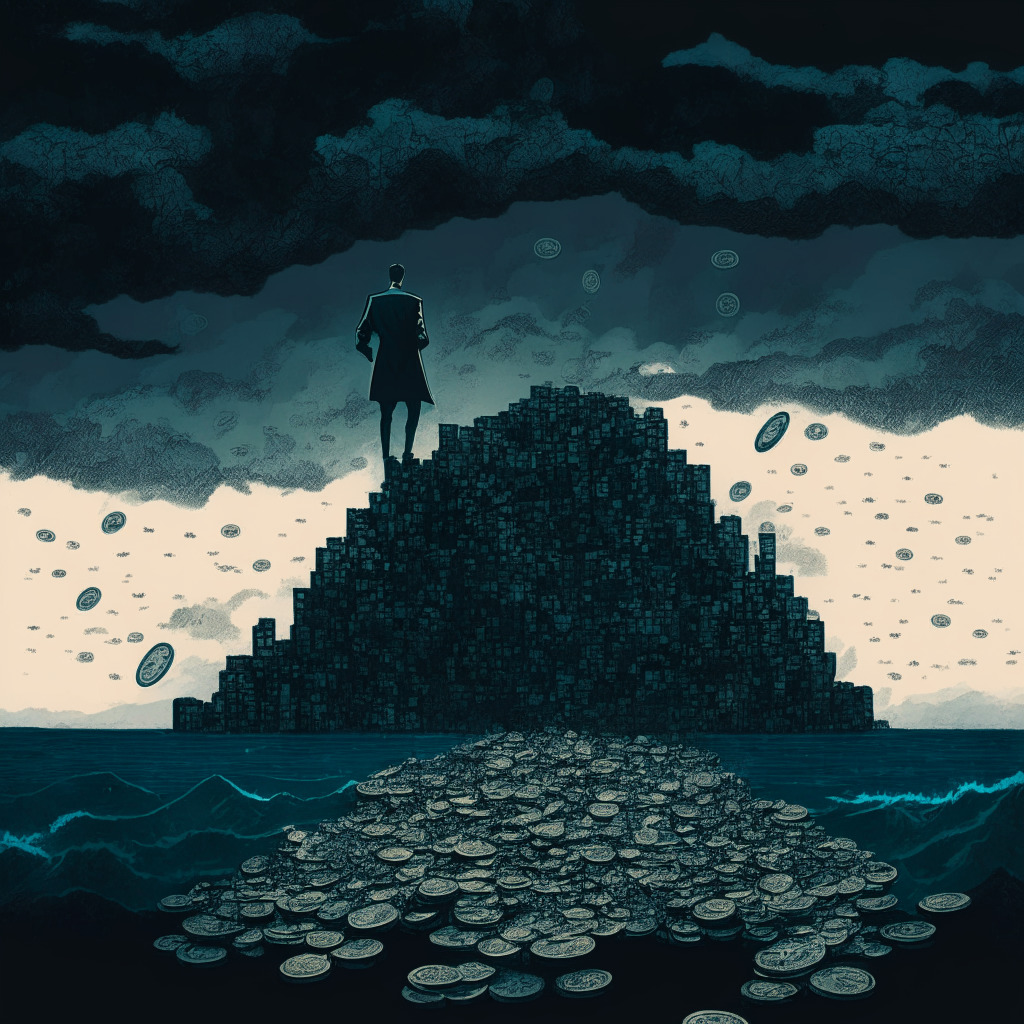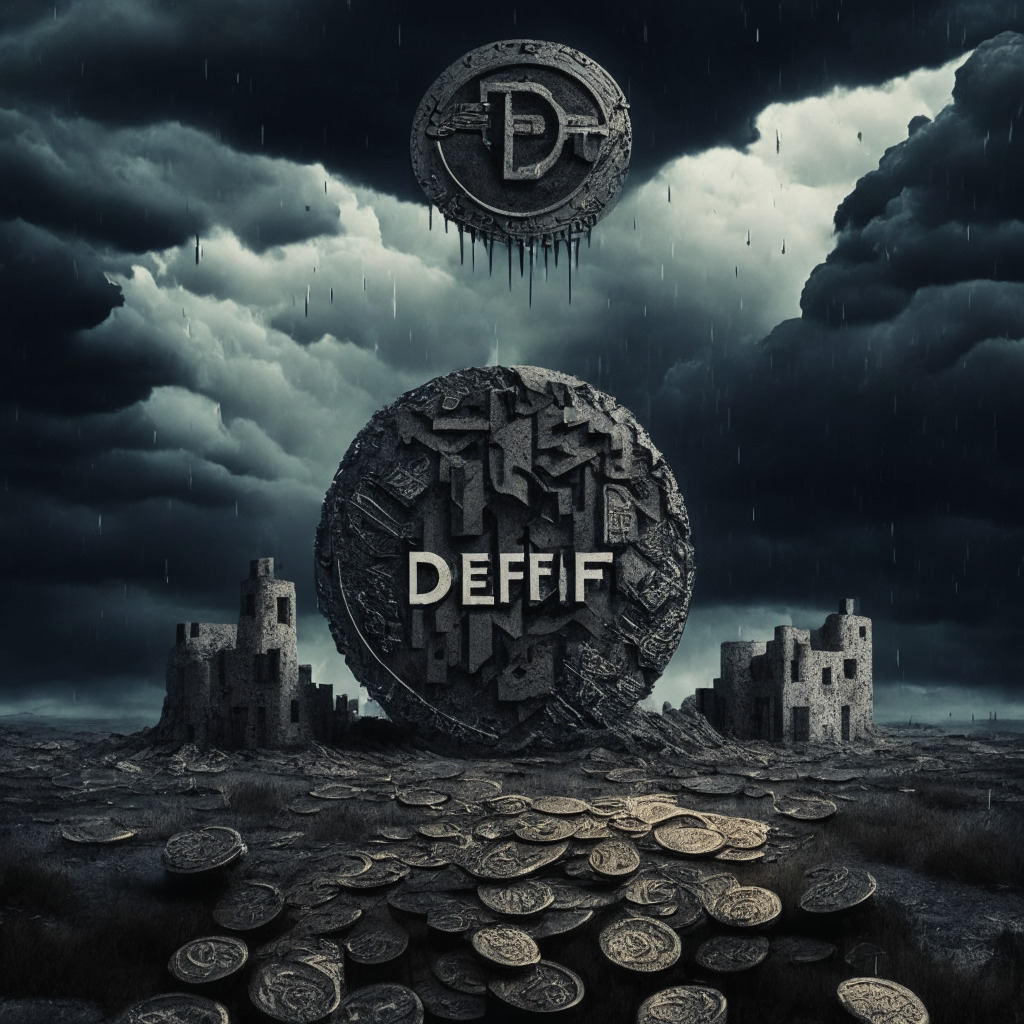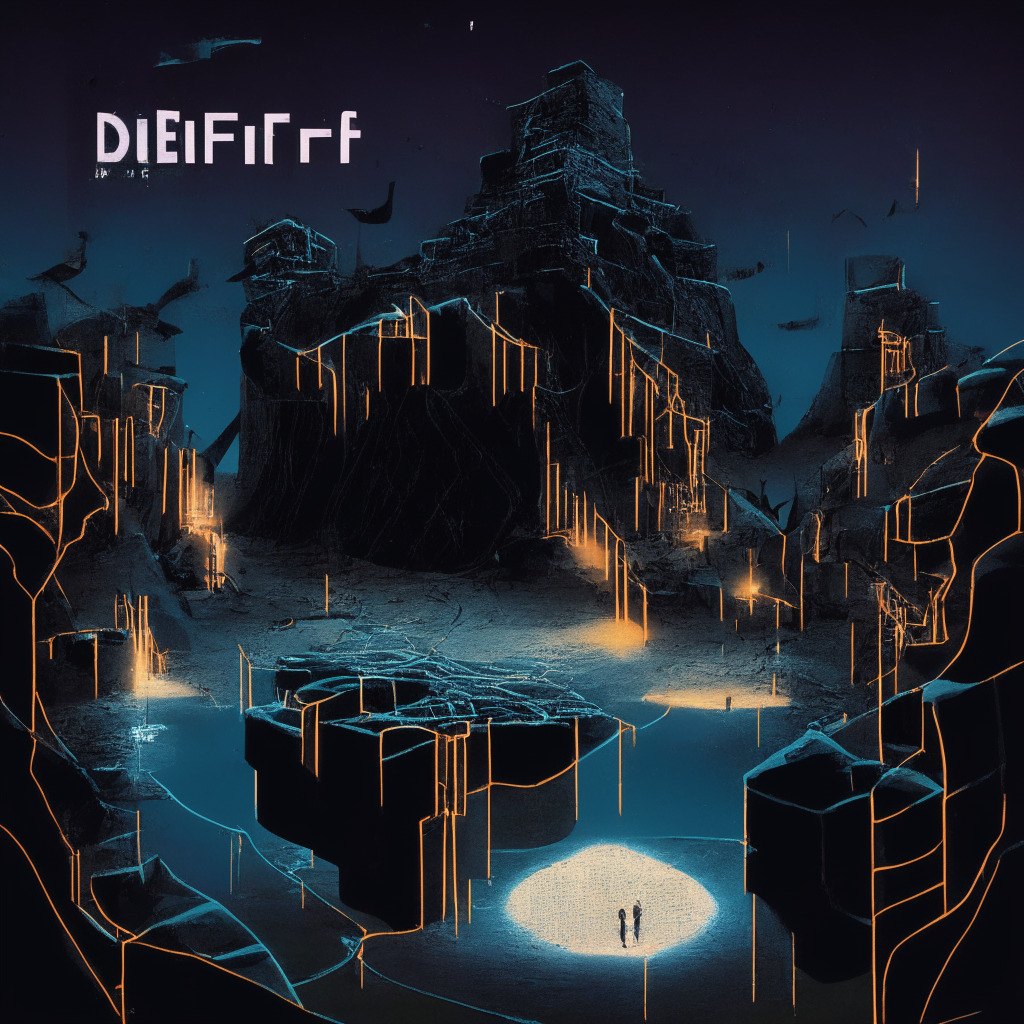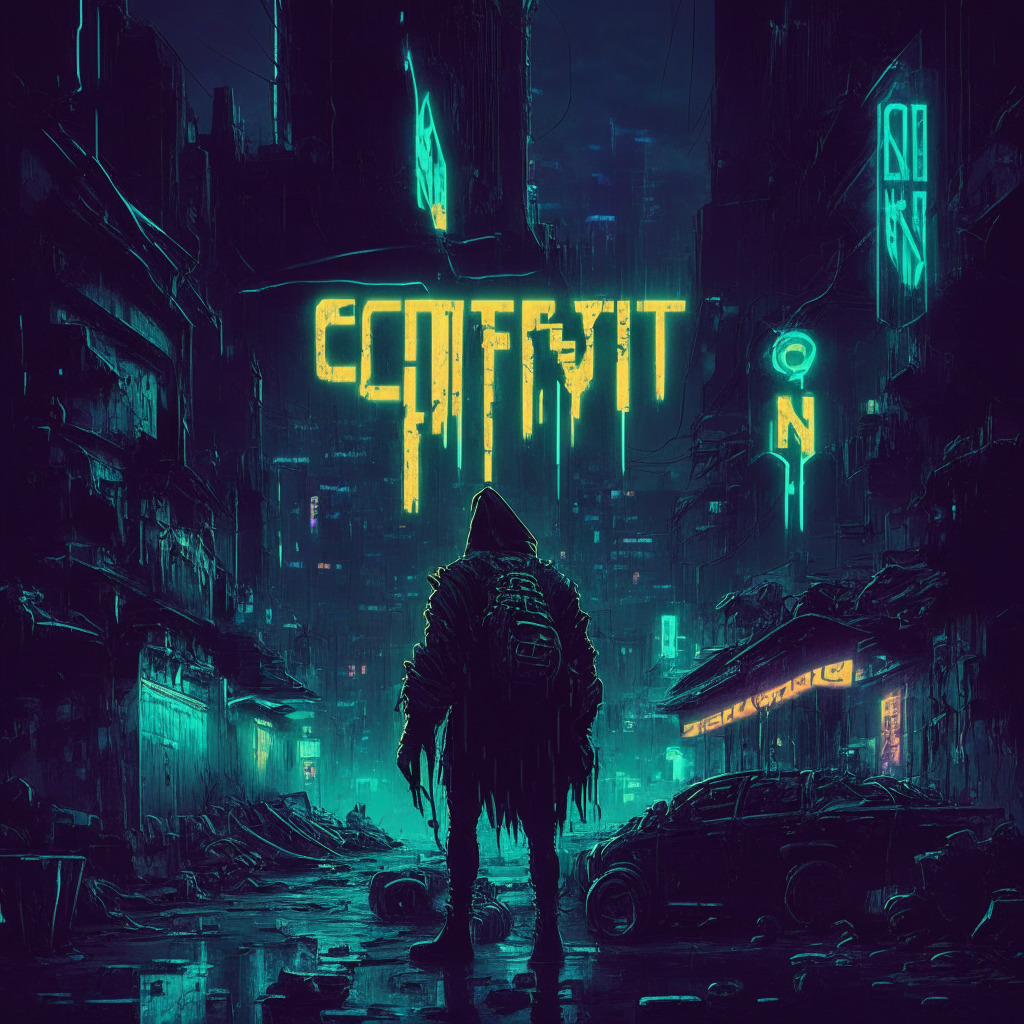Curve founder, Michael Egorov, is exploring unexpected avenues to manage his crumbling DeFi loans. Egorov sold off CRV tokens below market rate to individuals with notorious reputations causing concerns. Despite paying off substantial debts, a large financial obligation remains, spotlighting the high-risk DeFi world and potential drastic actions in disastrous financial situations.
Search Results for: Michael Egorov
Navigating the Unsettled Seas of Crypto World: Egorov’s Debt & Nigeria’s Binance Battleground
“The world of decentralized finance (DeFi) is filled with both promise and risk. Recent concerns about Curve Finance’s founder’s $100 million debt, backed by 400 million CRV tokens, could trigger a potential DeFi crisis. Also, Nigeria’s warning to Binance about operating without a license heightens risk levels and shows the need for vigilant crypto landscape and market monitoring.”
Navigating Complex Debt: Founder of DeFi Protocol Curve’s Multi-Million Dollar Maneuver
Michael Egorov, founder of DeFi protocol Curve, employed a strategy to settle his extensive obligations on Aave. He deposited millions of CRV as collateral on a lending platform, and borrowed Curve’s crvUSD stablecoin, which he exchanged for USDT to clear his Aave debt. Despite significant outstanding debt across several DeFi platforms, Egorov has been proactive in lessening his debt and usage rate.
Navigating Stormy Waters: How Curve Finance Founder’s Debt Reduction Casts Light on DeFi’s Potential Pitfalls and Promises
“Michael Egorov, founder of Curve Finance, reduced his debt to $42.7M through repayment on Aave’s DeFi platform and other key protocols. Despite the near $100M debt risk and a $47M loss from a security vulnerability that caused a CRV token price crash, Egorov continued to decrease his debt, offering a cautionary tale on DeFi debt and blockchain security risks.”
Dismissal of Lawsuit Against Curve Finance’s CEO: An Unfolding Legal Drama in Decentralized Finance
A lawsuit against Curve Finance’s CEO, Michael Egorov, alleging fraud and misappropriation of trade secrets was dismissed by a California judge due to procedural technicality. Egorov’s lawyers argued the case belongs in Switzerland, where both Egorov and his company, Swiss Stake resides.
Navigating the Crisis: Curve Finance Founder’s Struggle with $80 Million On-Chain Debts
Michael Egorov, the founder of Curve Finance, faces a potential crisis due to approximately $80 million on-chain debts to several lending platforms. Despite selling 72 million CRV tokens to mobilize funds, the risk remains high, especially if the CRV price drops dramatically.
Unraveling DeFi Instability: Curve Founder’s Actions as Catalyst for Market Risks
Michael Egorov, founder of Curve Finance, destabilized on-chain lending markets by leveraging his CRV holdings for large token loans, potentially triggering a wide-scale liquidation and distressing debts within the DeFi ecosystem. The situation underscores the importance of robust response strategies in the decentralized finance world.
Market Savior or Self-Preservation: Justin Sun’s Surprise Intervention in CRV Token Crisis
Just when pessimistic sentiments were high among crypto traders due to the recent CRV token price drop, a surprise intervention came from Justin Sun, the founder of Tron blockchain. Sun acquired around 5 million CRV from a wallet affiliated with Michael Egorov, Curve Finance’s Founder, thereby helping to shore up the token’s value. This was motivated by the desire to continue to fortify the bonds between Curve and Tron Network with plans to introduce a stUSDT pool on Curve.
Navigating Debt Crisis: How Curve Creator’s New Liquidity Pool Could Stabilize CRV Tokens
Michael Egorov, creator of Curve, has introduced a new liquidity pool, crvUSD/fFRAX, on his decentralized exchange to mitigate potential debt crisis and repay a curve token (CRV)-backed loan. The pool, bolstered with 100,000 CRV rewards, is aimed at decreasing the utilization rate to prevent unsustainable interest charges, attracting more liquidity into the system and providing respite from daunting debt levels.
The Brewing Storm in Crypto: CRV Tumbles, Sparks Fuels Volatility and Widespread Impact
Curve’s native token, CRV, continues to tumble potentially causing trouble for Michael Egorov, the founder of decentralized exchange Curve. With the CRV hitting a low unseen since November, traders fear Egorov’s large borrowing positions against Aave and Frax. This widespread concern is causing a bearish outlook in the crypto market and future of Curve.
Curve Founder’s Risky Loans Threaten CRV Value: Impending Liquidation and Market Repercussions
Curve DAO’s governance token CRV suffered a 12% drop as founder Michael Egorov took risky loans on Aave, depositing 431 million CRV and borrowing $101.5 million stablecoins. A $107 million liquidation threat looms if CRV falls below $0.37, sparking a proposal to freeze Egorov’s loans and prevent further CRV loans. The negative bets on CRV create an opportunity for a potential quick upside move.
Crypto Founder’s Debt Repayment: Balancing DeFi Stability & Market Risks
The wallet associated with Curve Finance founder Michael Egorov partially repaid a debt to lending protocol Aave, alleviating potential liquidation and selling pressure concerns. The wallet holds over 288.7 million Curve DAO tokens and has 60.7 million USDT borrowed against it, accounting for over 30% of the entire CRV token supply.
CRV Collateral on Aave: Assessing Liquidation Risk Amid Token Volatility and Debt Concerns
Over 34% of circulating CRV tokens have been deposited into decentralized lending platform Aave as Curve Finance founder Michael Egorov attempts to protect a $65 million stablecoin loan from liquidation risk. However, concerns arise over this strategy’s long-term effectiveness due to the CRV token’s price fluctuations and Aave’s previous actions in addressing debt-related issues.
DeFi Fraud Lawsuit: Curve Finance CEO Faces Allegations, Exposing Regulatory Challenges
This excerpt discusses a fraud lawsuit filed against Michael Egorov, CEO of Curve Finance, by venture capital firms alleging misappropriation of trade secrets and defrauding them out of nearly $1 million. The case highlights the ongoing challenge of enforcing regulations and ensuring legal accountability across decentralized platforms in the world of DeFi.
Crypto VCs vs Curve Finance Founder: Unraveling the Deceptive Practices Allegations
A legal battle has erupted between crypto venture capital firms ParaFi, Framework Ventures, 1kx, and Curve Finance founder Michael Egorov. The firms accuse Egorov of deceptive practices, misappropriating trade secrets, false statements, and improperly managing assets. Egorov’s defense team argues it’s a strategy to challenge ongoing litigation in Switzerland.
Unveiling the Veil: Chainlink’s Multisig Reduction and Other Noteworthy Crypto Developments
Chainlink’s change to its multisig wallet practices has raised questions around transparency and accountability in the crypto world. Meanwhile, Mixin Network offers a bounty to recover exploited funds, Uniswap seeks increased funding, and Curve Finance’s founder reduces his debt. Progress, despite controversy, highlights the resilience and potential growth of the DeFi sector.
The Controversial Loan Request by Wintermute Trading: A Threat to Yearn’s Decentralization?
“Wintermute Trading faces criticism as they negotiate a loan of 350 YFI tokens from Yearn Finance. Yearn’s supporters challenge the benefit to Yearn from this deal, questioning its alignment with Yearn’s philosophy of decentralized finance. The main issue lies in Wintermute’s intention to borrow Yearn’s governance token, potentially undermining Yearn’s foundation of decentralization.”
Navigating the Wake of Aave’s Lending Crisis: De-Risking Measures and Decentralized Decision-Making
Aave token users face two key governance decisions that could reshape the protocol’s future, particularly in managing systemic liquidation risk. Proposals under consideration include disabling borrowing of CRV (Curve’s governance token) on Ethereum and Polygon V3 networks, and reducing the liquidation threshold of CRV.
The Curve conundrum: A DeFi Chronicle – Debunking Untouched Vulnerabilities and the Road Ahead
Last month, renowned decentralized exchange, Curve, suffered a hack that led to a loss exceeding $70 million, sending its native token, CRV, into a sharp downward spiral. While ongoing risky lending practices compounded the concern, Curve made a remarkable recovery, recovering almost 75% of the lost assets. This incident underscores the vulnerabilities within DeFi platforms and the importance of preparedness for unexpected events in the decentralized finance space.
DeFi Security Scare: The $61 Million Curve Finance Breach Study
A recent exploit targeting the Curve Finance pools via the Vyper programming language led to a $61 million theft, exposing DeFi vulnerabilities. This event has sparked discussions about security in the blockchain era and emphasized the need for continuous investment in safety protocols. Despite losses, it also presents an opportunity for DeFi platforms to refine and rebuild.
Curve Finance’s CRV Stolen Funds: A Tale of Recoveries, Risks and Potential Returns
The recent 7% rally of Curve Finance’s native token, CRV, is linked to the return of stolen funds by a hacker who had drained more than $50 million from multiple DeFi protocols. Although anticipation for full funds return has risen, the heist has highlighted vulnerabilities in decentralized investor fund security, shaking confidence, and posing a potential obstacle for CRV’s future growth.
Understanding the Current Crypto Crisis: The Plight of CRV and the Rise of XRP20
The article discusses the recent downturn in the crypto market triggered by the Curve DAO exploit, which led to over $60 million in assets theft and a 30% drop in CRV’s value. It also introduces XRP20, an Ethereum token not officially linked to Ripple, which has raised more than $100k within 24 hours and appeals to retail investors due to its affordability.
The Impact of Curve Finance’s $52M Hack on CRV’s Market Performance and Future Prospects
“Following a cyberattack that exploited a flaw in the Vyper programming language, Curve Finance’s native token, CRV, experienced a 3% increase but remains 18.5% lower than its pre-hack value. Curve Finance saw a sharp drop in confidence, offering the hackers a 10% bounty for stolen funds returned by August 6, with potential market-reaching consequences.”
Aave’s Founder’s Proposal to Purchase $2M CRV Tokens: Boost for DeFi or Risky Gamble?
“Aave founder Marc Zeller proposes the Aave Treasury to purchase $2 million worth of CRV tokens, stirring mixed reactions in the DeFi community. Some see this as a boost to the DeFi ecosystem, others warn about increased risk of CRV liquidation.”
Crypto Solidarity: Understanding Justin Sun’s Rescue of Curve Finance from Looming Crisis
In an effort to save the decentralized exchange protocol, Curve Finance, from a potential bad debt crisis, crypto investor Justin Sun purchased approximately 5 million Curve tokens. Sun’s actions helped preserve the value of CRV tokens and demonstrated the potential of collective action in protecting investments amid the volatile nature of the cryptocurrency market.
Navigating AAVE’s 17% Drop: Risks, Resilience and the Prospects of DeFi Markets
“The recent 17% decline in the AAVE token value has ignited discussions about the volatile nature of the cryptocurrency market. Despite challenges such as the risk of cascading liquidations on DeFi protocols and depegging of the GHO stablecoin, the Aave protocol remains resilient with a substantial insurance fund and steady fee revenue.”
Binance Bolsters Crypto Market: A Bold Rescue of Curve’s CRV Amid Collapse Fears
After an exploit saw Curve’s native token CRV plummet, market makers at Binance upped their buy orders within 2% of the mid-price from 500,000 to over 1 million CRV. This unusual response to a falling currency is seen by many as a strong supporting move that may have prevented widespread fallout in the decentralized finance market. Despite this, CRV fell by over 14%, sparking alarm across the sector.
Abracadabra’s Abrupt Solution: 200% Interest Hike and Its Mixed Reactions in Crypto Community
“Abracadabra Money, a cross-blockchain lending platform, proposes a rate hike to counterbalance its CRV exposure risks by increasing its outstanding loan interest rate by 200%. This is in response to recent exploits that exposed Abracadabra to significant CRV risk, leading to a liquidity crisis.”
Navigating the Storm: An Examination of the Recent Turbulence in DeFi and Its Financial Implications
“Gauntlet, a risk management firm, suggests a zero value for the Loan-to-Value (LTV) ratio of CRV tokens on Aave, a renowned lending and borrowing platform. This follows a drop in CRV liquidity, represented by a $158 million collateral account, and aims to prevent potential loan borrows. This controversial move traces back to an exploit on Curve Finance, significantly impacting CRV’s price and threatening liquidation of some assets.”
The Rise and Crisis of DeFi: A Close Brush with Disaster and Its Implications
“The DeFi community recently faced a potential crisis when Curve Finance’s founder risked significant funds on his platform’s tokens. This precarious scenario could have toppled the entire DeFi sector. The incident has sparked questions about the system’s integrity, transparency, and overall stability, reminding us of the inherent risks of the rapidly evolving DeFi world.”
Navigating Volatility: A Peek into the Risk, Reward, and Resilience of Cryptocurrency Markets
“Cryptocurrency including Bitcoin is on a downward trend, significantly influenced by second quarter performance. This dynamic market, subject to influence from major investors and legal issues, relies on indicators like market depth to predict behavior. The potential impact of large-scale liquidations further complicates this unpredictable field.”
Unraveling The Future of DeFi: AI Predictive Analysis Meets Market Risks and Potential
“ChatGPT, an AI tool based on GPT-3.5, offers insights into potential futures of decentralized finance (DeFi), suggesting it may disrupt traditional finance, yet posing regulation and scalability challenges. It underscores the importance of cross-validating AI-generated content with reliable sources and critical thinking.”































